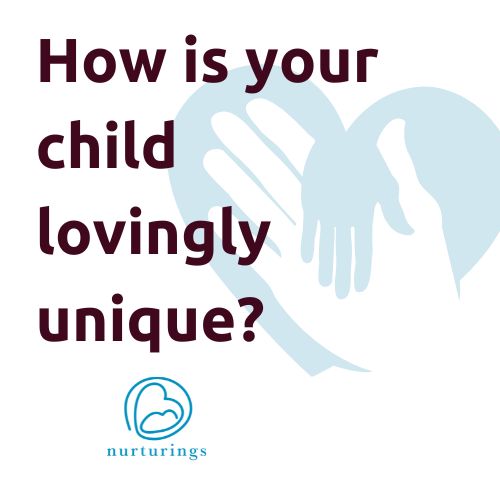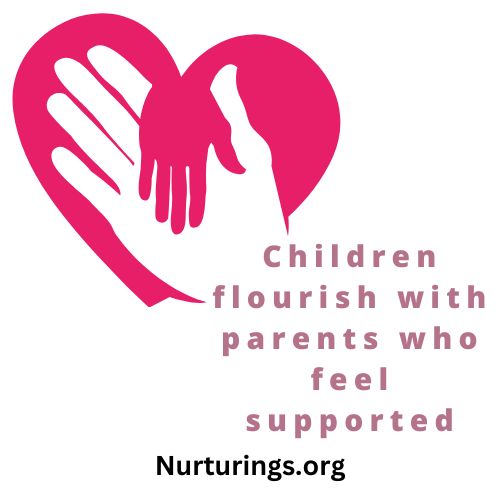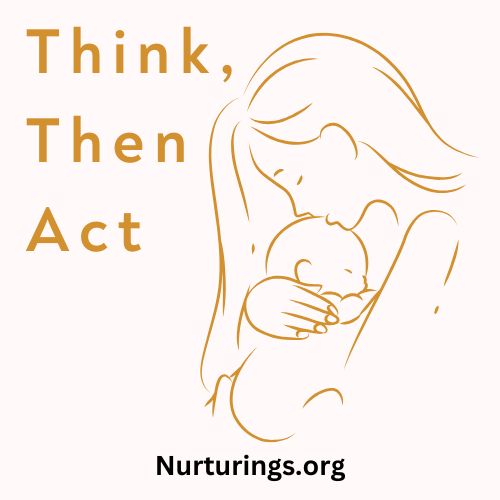My 5-year-old is happy as long as she's around me. As a baby, she would spend all day content in a sling that I wore.
I found Nurturings when she was just over 1 year old.
I had befriended a mom at a local breastfeeding support meeting. We had both researched how to start a Nurturings parents’ group. We each felt that a parenting support group was desperately needed in our local area.
One month later, this friend and I held our first Nurturings group meeting. Since then, we've had many wonderful meetings, added group leaders, and made lots of new friends! I don't know what I would've done through the past many years without these other parents in my life.
I now have two daughters, my 5-year-old and a 2-year-old. I am thankful for Nurturings pointing me to the Eight Principles of Parenting, which have been my guiding force through my parenting approach with my children.
My oldest daughter was verbal at an early age, but she would only talk around me, my husband, and my mom. At Nurturings meetings, she wouldn't leave my side to play with the other children, even when the meetings were held in our home. Dear friends who had known my daughter all her life never heard her speak until she was 3 years old.
I was so fearful I was doing something wrong, causing my daughter to be so reserved, so I reached out to my Nurturings group with questions. It was suggested to learn ways to help me daughter ease her fears. I felt in my heart that I could equip my daughter with confidence and the support she needed to overcome this challenge.
I learned that my first step was to make sure my daughter didn't feel guilty for not talking to people. That was harder than I thought it'd be.
So many people in our lives -- friends, family, and strangers -- tried to elicit a verbal response from her by making her feel bad for not speaking to them. Others would stop talking to my daughter and instead talk about her in front of her since she didn't speak to them. Although I refused to describe her as "shy," other people used the word around her on an almost daily basis. My heart hurt for her.
Because of the parenting support I received from my Nurturings group, I focused on constantly reassuring my daughter that I love her and like her for who she is. I gave her lots of positive reinforcement. I stopped pressuring her to speak to other people.
I vividly remember one evening when we were getting ready to go visit my sister and her family to go swimming and have a family dinner. At first, my daughter was excited but then got a worried look on her face. I asked her what was bothering her, and she asked, "Mom, do I have to talk to Aunt Margaret?" I kneeled down, looked her in the eye, and said, "No, Honey, you don't have to talk to her if you don't want to. It's fine."
The look of relief on my daughter's face was unmistakable as she replied, "Really, Mom? I really don't have to? It won't hurt her feelings?" I reassured her that no one's feelings would be hurt and that her aunt knew how much she liked her even if she didn't talk to her. My daughter wrapped her arms around my neck and thanked me. I hugged her back while choking back tears.
That was a turning point. That's when I solidified my role as an advocate for my daughter, talking to my family and friends about the importance of not pressuring her to talk.
In less than a year after this turning point, my daughter was talking to all of her family members. I remember crying when she walked up to my dad and asked him to read a book to her. My dad cried, too. I remember how my daughter was confused about what the big deal was!
After this, she began talking to other children at the swimming pool and to waiters at the restaurants we most frequent.
My daughter will likely never be chatty and will likely continue to be considered reserved, preferring the company of other gentle and compassionate souls like hers. But she has become a confident, happy girl.
Me learning to accept her for who she is, my refusal to let myself and others burden her with derogatory labels, and our willingness to let her work through her anxiety on her own timetable has helped my daughter develop into a confident, happy girl.
In what way is your child lovingly unique? How can you let your child know you love and appreciate him or her?



